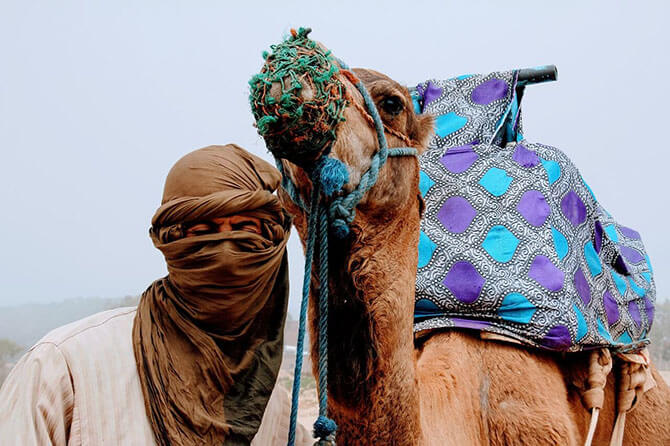Who are the original inhabitants of Morocco?
The population of Morocco is around 38 million, concentrated in the coastal plains and especially around Casablanca, Rabat, Fez, and Tangier. The Moroccan people are a mixture of the aboriginal Berbers, and the Arabs who invaded the region in the 7th century. Although the races are now well mixed, there is still a considerable number of full-blooded Morocco Berbers in the remote mountain areas! Where a quarter of the population can speak only their native Berber tongue. Physically they are quite different from the dark-eyed Arabs, with reddish hair and most striking blue or green eyes. In the far south you will meet the Tuareg, the nomadic tribesmen of the Sahara, easily recognized by their dark skins and dark blue robes.
Morocco Berber History
Morocco is a vast and varied territory, only recently united into a modern nation-state. Its long history records a struggle for ascendancy among the Morocco Berber tribes of the mountains and the Arabs of the plains! The rise, and fall of powerful dynasties, the creation and collapse of mighty empires; and, from the 18th century onward, manipulation and exploitation by European powers seeking to expand their empires.

The Phoenicians were the first to explore this far western land, setting up a trading post at Liks (Lixus) on the Moroccan coast around 1000BC. In the succeeding centuries they and their descendants, the Carthaginians, founded many such outposts, including those at Tangier and Essaouira! While also building a town at the site of present-day Rabat. They called the fierce inhabitants of the interior Barbaros, whose meaning, ‘not of our people’, persisted through the ages as ‘Berber’. (The English word ‘barbarian’ has the same root.)
Must Read: Traveling to Morocco | Where is Morocco located?
Where did the Berbers of Morocco originally come from?
The origins of the Berbers remain a mystery. Some theories link them with the Celts, the Basques, and even the Canaanites, but it is far more likely that they are descendants of the Neolithic Capsian culture. which spread through North Africa in the 5th and 6th millennia Bc. Berbers of Morocco have preserved their own languages and traditional customs right down to the present day.
Morocco Berbers Religion
This huge and varied country is unified by Islam, the national religion, headed by the king, who is the spiritual leader of the community. Like all Muslims, Moroccans must adhere to the principles known as “The Five Pillars of Islam’: to accept that “there is no God but God, and Mohammed is his Prophet’; to pray five times daily, at dawn, midday, afternoon, sunset and after dark; to give alms to the poor and contribute to the upkeep. of the mosques; to fast between sunrise and sunset during Ramadan; to try to make the pilgrimage (hadj) to Mecca at least once.
“”In Morocco life moves at a slower pace, and there is time to rest in the shade and chat.
Must Read: 10 Best Places To Visit in Morocco in 2021
Berber peoples of Morocco

Morocco Berbers are by nature friendly and welcoming, and proud of their heritage; don’t be discouraged by the touts and hustlers who hang around the more popular tourist attractions. In the countryside especially you will encounter genuine hospitality and a real interest in your travels. You will often be offered a glass of mint tea a long-established custom and a mark of friendship asked where you come from and where you are going! And much pleasure will be taken in answering your own questions about the village, its crafts, and its customs.
Must Read: What language in morocco do they speak? Useful guide
Far too many visitors miss out on the best of Morocco “Morocco travel way” by sticking to the popular package holiday resorts of Tangier Marrakesh and Agadir. Make the effort to explore a little further afield and you will be rewarded with an experience every bit as exciting as the more expensive attractions of exotic long-haul destinations. As you will find out, the true magic of Morocco reveals itself only to the traveler with a sense of adventure.










